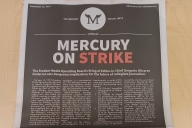You have /5 articles left.
Sign up for a free account or log in.
NYT headlines today reflect a mature understanding of the Internet. In the "Technology" section there are no articles on "technology" per se, for example semi-conductors, fiber optic cables or wireless access points. (The Times does cover these matters in its "Science" section anyway.) Rather, there are economic, legal, and social articles about technology.
An Op-Ed on the need for privacy regulations, for example, acts as a prompt to the Federal Trade Commission to complete the deal with Facebook on rules that would cabin, to some small degree, their hitherto unregulated use, and misuse, of personally identifiable information. The fact that it has not been regulated is a recognition that the Internet does indeed prompt the need for new law. Facebook is not how many people use it, a public playground of personal identity in the digital age, but a for-profit company, deeply intertwined with market avarice for information, a private site with terms of service to which half a billion people have agreed, knowledgable, or not, of all that they give away.
Google has already agreed to some oversight. Google is rewriting the rules of regulation. "Write the rules, make it easy on the FTC, and, above all things, don't let it go to the DOJ!" is secretly their motto (go Alan Davidson!). Having learned from watching Microsoft fall down the regulatory rabbit hole, Google has carved out a path that Facebook has followed albeit less willingly. Stay tuned. I predict that Zuckerburg might agree today and run afoul tomorrow of the agreement; he has almost a congenital penchant to push beyond boundaries. If Facebook goes public, the first move the Board should make is to get a businessman in the CEO role and put Mark in Special Projects to avoid that trajectory.
The Time's coverage of the Internet is subliminally the economic story. That coverage was good before Jill Abramson took over as Executive Editor, but it has taken a quantum leap since. It is set to outpace the initial pioneers, such as Slate, and the glossy wanna be Huffington Post. But for those who do not follow journalism's underbelly, just look at the article on Yipit -- a New York based Internet company -- or Bellafonte's thought piece about New York as a tech "hot spot," to get the inseparable feel of money and technology as the defining features of early twenty-first century global society. New York City seeks to leverage its historic strength in management, or, as recent history has demonstrated, mismanagement, of money by moving from mortgages to technology. Too bad Bloomberg had not thought to nudge investment banking a decade earlier, but now that the damage is done let's hope that Massachusetts votes Warren into the Senate and that Cornell wins the bid for Roosevelt Island.
Finally, check out the article about being "on the town, always on line." Social use of the Internet all the way. Read altogether, in these articles one recognizes the Internet as a cultural phenomenon. So it is no wonder that the most important one was Stanford's investment in a distance learning secondary school for high achievers. My father used the old saw about restaurants, "location, location, location" many a time in his years serving the people of downtown Rochester a plate of pasta or a high ball. His daughter cannot shout loudly enough, "Education, education, education" all the way!






